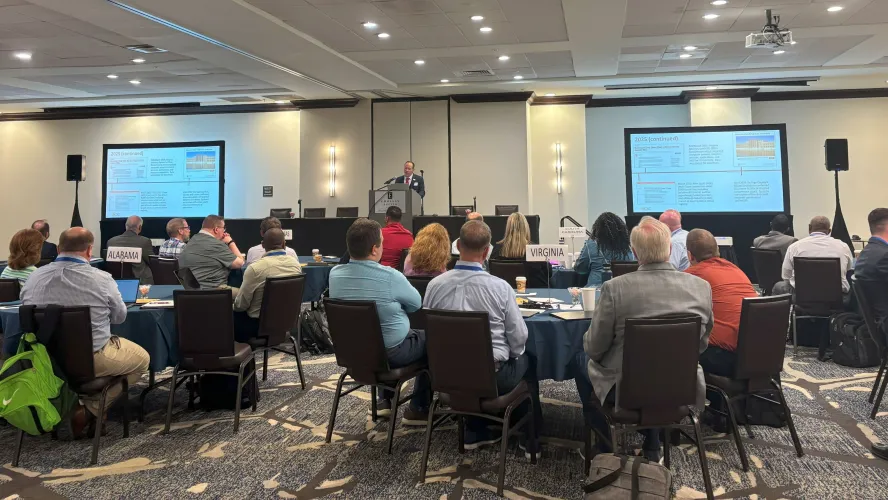Strengthening your court's response to a cyberattack with planning, training & practice

Teams of judicial leaders, IT professionals, emergency managers, and communications staff from Alabama, Arkansas, Florida, Puerto Rico, South Carolina, Virginia, and the U.S. Virgin Islands, participate in the southern region cybersecurity and disaster recovery workshop in Orlando.
Background
A 2021 survey by NCSC revealed a notable increase in the number of courts experiencing disruptive cyber incidents, nearly doubling from 18% to 33% over four years.
The Center for Internet Security (CIS) reported a 148% increase in malware attacks targeting state and local governments, including courts, in the first eight months of 2023.
This trend continues with recent cyber incidents occurring in courts in Colorado, Florida, Georgia, Mississippi, Missouri, Ohio, and Pennsylvania.
So how do we reverse the trend or better prepare to respond if an attack occurs ?
Building effective response teams
Cybersecurity and disaster recovery training, including practice with tabletop exercises, can strengthen your court's defense against attacks by building resiliency and developing recovery strategies. Preparation is a team effort built on partnerships across court leadership, IT, and outside providers. Engaging key court personnel in training deepens the interdepartmental relationships needed to effectively respond to a cyber event.
Court cybersecurity response teams may include:
- A leading judicial officer
- A leading administrator
- CIO/CTO/CISO staff
- Public information officer or communications manager
- Emergency operations manager
Finding the right training for your court
Training helps courts identify key components of a cybersecurity and disaster recovery response and reveal blind spots and vulnerabilities that need to be addressed.
Working with CIS, National Emergency Management Association, Joint Technology Committee and Court Information Technology Officers Consortium, we've launched a series of regional workshops made possible by a grant from the State Justice Institute. Past events took place in the West, Mid-Atlantic, and South. Future dates are in the Midwest in September 2025 and New England in April 2026.
These workshops feature a comprehensive four-week training program that follows a three-part format:
- Online educational sessions
- Self-paced information gathering and preparation
- In-person tabletop exercises with peers and experts
Courts unable to participate in the regional workshops can look to other training opportunities including tabletop exercises, in-person or online instruction, or our workshop workbook to get started. Our team can also develop custom courses to suit your needs,
Looking ahead
It's never too early to prepare for the unexpected. With proper planning, training and following best practices, your court can build resilience against a cyberattack.
Additional resources
Key elements of continuity planning
Continuity planning (COOP) helps ensure the continuation of critical court functions during a wide range of emergencies. Planning helps courts choose the right people to respond and how to best prioritize resources and focus following an emergency or threat.
Leadership & collaboration
Having the support of the presiding or chief judge and court administrator is critical. A comprehensive COOP planning team can assist with delegation of authority and establishing outside relationships.
Essential functions
Determine which critical activities are directly related to the court's mission. This limited set of court functions should be continued throughout the event, or resumed soon after, to avoid unnecessary disruptions.
Business process analysis
This analysis helps courts identify essential functions, recovery time objective, department/person responsible, key staff, resource needs, and other important aspects related to your response.
Our experts
Ready to get started?
Our team can help you identify the best training opportunities for your court and provide additional details about our upcoming regional workshops.
Explore more
Cybersecurity basics for courts
This Joint Technology Committee guide helps court administrators, IT leaders, judges, legal teams and staff establish cybersecurity measures including incident response teams, regular risk assessments, clear communication strategies and maintenance of public trust, in order to guard against a growing threat of cybercrimes such as ransomware, malware, phishing and insider threats.
Assessing cybersecurity in the courts
This in-depth report uses surveys and on-site assessments to examine the growing need for data protection in the justice system, the cybersecurity challenges many courts face today, and potential paths for safeguarding crucial information.
Court cybersecurity
NCSC offers expert guidance and solutions, like risk assessments and policy frameworks, to help safeguard court systems from cybersecurity threats.




